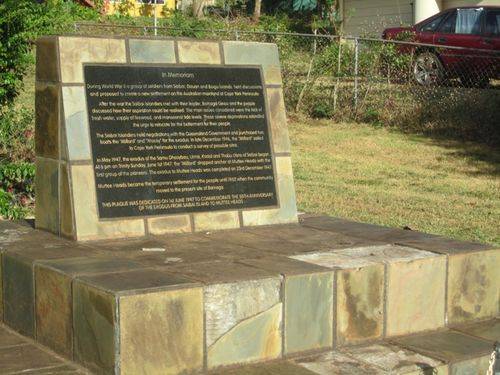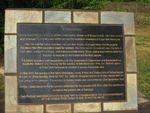
Home » Themes » Culture » Indigenous
50th Anniversary of the Exodus from Saibai to Muttee HeadsPrint Page 
The monument commemorates the 50th anniversary of of the exodus from Saibai Island to Muttee Heads.
After World War Two, the enlisted men returned to the island, informing the community of a place on The Mainland they believed would provide the Saibai community with a sustainable future. Soon after, a combination of wet season rain and king tides flooded Saibai Island. Saibai's leader, Bamaga Ginau, called a meeting to hold discussions regarding the problems being caused by this flooding and the affect it was having on the fresh water supply, the limited supply of wood for building and the area of land available for future housing - concerns were increasing about the islands ability to support future generations. The decision was made to relocate to the mainland and in 1946 the community purchased two luggers for the relocation.
Over the course of 1947 the “Macoy” and “Millard” luggers were used to transport Chief Bamaga and the people of Saibai to Cape York Peninsula. A temporary site at Muttee Heads was selected, The Department of Native Affairs (D.N.A.) arranged the erection of a temporary medical post and store, a temporary church was also erected. As more families arrived more housing was required, using the old army huts from the war and any building materials found many homes and a school for the children were built.
Once all the families had arrived Chief Bamaga, the Minister of Lands and some of the islanders commenced the search for a suitable site for their permanent relocation. The land inland of Red Island was chosen, an ideal location with two creeks for fresh water. Early in 1949, with Chief Bamaga ill and in Thursday Island's hospital, the community's Chairman and Deputy Chairman visited Badu Island for the election of island representatives. A few days after this election Chief Bamaga passed away, he was laid to rest at Cowell Creek, Injinoo. On September 9th 1949 The D.N.A. invited all Torres Strait Islanders to the consecration of land that had been selected by Chief Bamaga before his passing. During the ceremony the land was named “Bamaga” in honour of their Chief.
Location
| Address: | Adidi Street, Bamaga, 4876 |
|---|---|
| State: | QLD |
| Area: | AUS |
| GPS Coordinates: | Lat: -10.886643 Long: 142.388585 Note: GPS Coordinates are approximate. |
Details
| Monument Type: | Monument |
|---|---|
| Monument Theme: | Culture |
| Sub-Theme: | Indigenous |
| Actual Event Start Date: | 01-June-1947 |
| Actual Event End Date: | 01-June-1997 |
Dedication
| Actual Monument Dedication Date: | Sunday 1st June, 1997 |
|---|
In Memoriam
During World War II a group of soldiers from Sabai, Dauan and Boigu Islands held discussions and proposed to creat a new settlement on the Australian mainland at Cape York Peninsula.
After the war the Sabai islanders met with their leader, Bamaga Ginau and the people discussed how their aspirations could be realised. The main issues considered were the lack of fresh water, supply of firewood, and monsoonal tide levels. These severe deprivations rekindled the urge to relocate for the betterment of the people.
The Saibai Islanders held negotiations with the Queensland Government and purchased two boats the "Millard" and Macoy" for the exodus. In late December 1946, the "Millard" sailed to Cape York Peninsula to conduct a survey of possible sites.
In May 1947, the exodus of Samu Dheoybau, Umai, Kadal and Thabu clans of Sabai began. At 6 pm on Trinity Sunday, June 1st 1947, the "Millard" dropped anchor at Muttee Heads with the first group of pioneers. The exodus was completed on 23rd December 1947.
Muttee Heads became the temporary settlement for the people until 1952 when the community moved to the present site of Bamaga.
This plaque was dedicated on 1st June 1997 to commemorate the 50th anniversary of of the exodus from Saibai Island to Muttee Heads






